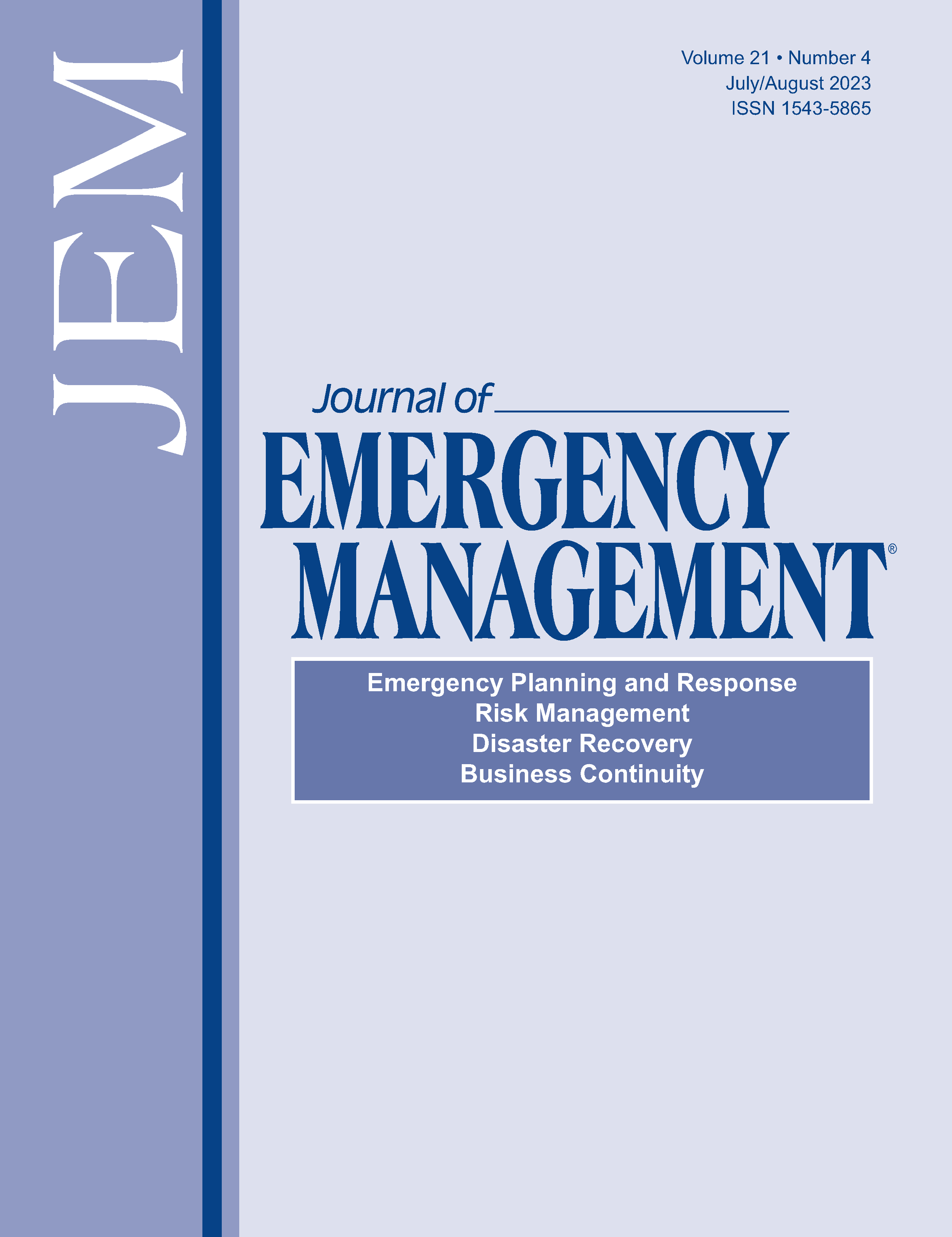“None of us was prepared”—Caring for vulnerable people during the heatwave in Sweden in 2018
DOI:
https://doi.org/10.5055/jem.0785Keywords:
heatwaves, climate change, urban heat islands, vulnerable groups, qualitative, interviews, municipality, SwedenAbstract
Climate change is increasing the risk for extreme weather events such as heatwaves, including in northern countries like Sweden, which until recent years has had limited experiences of coping with extreme heat. Based on predictions that Sweden will be more frequently exposed to heatwaves in the future, it is imperative to increase the societal resilience and adaptation measures. This paper presents a qualitative interview study involving 19 participants and their experiences of caring for vulnerable people during the heatwave in 2018. The participants represent four different organizations (working directly or indirectly with vulnerable people) in two municipalities in Sweden, including preschools, homes for the elderly, homecare services, and care homes for people with functional impairments, which were all impacted during the heatwave. This study contributes new empirical insights about the heatwave in 2018 and, in particular, similarities and differences in both experiences and adaptation measures across the four organizations. The findings show how both staff and vulnerable people suffered from the consequences of heat which increased vulnerability, how some organizations lacked enough (qualified) staff to secure routines, and that few evaluations and formal changes were done after the heatwave.
References
Intergovernmental Panel on Climate Change (IPCC): Climate change 2022: Impacts, adaptation and vulnerability. 2022. Available at https://www.ipcc.ch/report/sixth-assessment-report-workinggroup-ii/. Accessed November 10, 2022.
World Meteorological Organization (WMO): State of the climate in Europe 2021 (WMO-No. 1304). 2022. Available at https://library.wmo.int/index.php?lvl=notice_display&id=22152#.Y2OobnbMJPZ. Accessed November 10, 2022.
Belusic D, Berg P, Bozhinova D, et al.: In Döscher R (ed.): Climate Extremes for Sweden—State of Knowledge and Implications for Adaptation and Mitigation. The Swedish Meteorological and Hydrological Institute (SMHI). September 2019. DOI: 10.17200/Climate_Extremes_Sweden.
Liu Z, Zhan W, Bechtel B, et al.: Surface warming in global cities is substantially more rapid than in rural background areas. Commun Earth Environ. 2022; 3: 219. DOI: 10.1038/s43247-022-00539-x.
Oke TR: The energetic basis of the urban heat island. Q J R Meteorol Soc. 1982; 108: 1-24.
Kovats RS, Hajat S: Heat stress and public health: A critical review. Annu Rev Public Health. 2008; 29: 41-55.
Oudin Åström D, Åström C, Forsberg B, et al.: Heat wave-related mortality in Sweden: A case-crossover study investigating effect modification by neighbourhood deprivation. Scand J Public Health. 2020; 48(4): 428-435. DOI: 10.1177/1403494818801615.
European Environment Agency (EEA): Urban adaptation in Europe: How cities and towns respond to climate change. EEA Report 12/2020. Luxembourg: Publications Office of the European Union, 2020. ISBN: 978-92-9480-270-5.
Rousi E, Kornhuber K, Beobide-Arsuaga G, et al.: Accelerated Western European heatwave trends linked to more-persistent double jets over Eurasia. Nat Commun. 2022; 13: 3851. DOI: 10.1038/s41467-022-31432-y.
Klinenberg E: Heat Wave: A Social Autopsy of Disaster in Chicago. 2nd ed. Chicago: The University of Chicago Press, 2015.
Carter TR, Fronzek S, Inkinen A, et al.: Characterising vulnerability of the elderly to climate change in the Nordic region. Reg Environ Change. 2016; 16: 43-58. DOI: 10.1007/s10113-014-0688-7.
Durgun YÖ, Håkansson M: Strategies to mitigate the effects of future extreme heat waves—A new method for mapping. IOP Conf Ser Earth Environ Sci. 2020; 588(3): 1.06-1.10.
Bäcklin O, Lindberg F, Thorsson S, et al.: Outdoor heat stress at preschools during an extreme summer in Gothenburg, Sweden—Preschool teachers’ experiences contextualized by radiation modelling. Sustain Cities Soc. 2021; 75: 103324. DOI: 10.1016/j.scs.2021.103324.
Malmquist A, Lundgren T, Hjerpe M, et al.: Vulnerability and adaptation to heat waves in preschools: Experiences, impacts and responses by unit heads, educators and parents. Clim Risk Manag. 2021; 31: 100271. DOI: 10.1016/j.crm.2020.100271.
Malmquist A, Hjerpe M, Glaas E, et al.: Elderly people’s perceptions of heat stress and adaptation to heat: An interview study. Int J Environ Res Public Health. 2022; 19: 3775. DOI: 10.3390/ijerph19073775.
SMHI: Värmebölja. 2022. Available at https://www.smhi.se/kunskapsbanken/klimat/varmebolja-1.22372. Accessed November 10, 2022.
Wilcke RAI, Kjellström E, Lin C, et al.: The extremely warm summer of 2018 in Sweden—Set in a historical context. Earth Syst Dyn. 2020; 11: 1107-1121. DOI: 10.5194/esd-11-1107-2020.
Åström C, Bjelkmar P, Forsberg B: Ovanligt många dödsfall i Sverige sommaren 2018 - Drygt 600 kan ha dött till följd av värmeböljan [High mortality during the 2018 heatwave in Sweden]. Lakartidningen. Swedish. 2019; 116: FLFH.
Regeringen: Skogsbränderna sommaren 2018. SOU 2019:7. 2018. Available at https://www.regeringen.se/4906d2/contentassets/8a43cbc3286c4eb39be8b347ce78da16/skogsbranderna-sommaren-2018-sou-2019-7.pdf. Accessed November 10, 2022.
Nationella Rådet för Klimatanpassning: Första rapporten från nationella rådet för klimatanpassning 2022. 2022. Available at https://klimatanpassningsradet.se/publikationer/forsta-rapporten-fran-nationella-expertradet-for-klimatanpassning-1.180035. Accessed November 10, 2022.
Buckle P: Re-defining community and vulnerability in the context of emergency management. Aust J Emerg Manag. 1999; 13(4): 21-26.
Guldåker N: Krishantering, hushåll och stormen Gudrun: Att analysera hushålls krishanteringsförmåga och sårbarheter [Doktorsavhandling (monografi), Institutionen för kulturgeografi och ekonomisk geografi]. Lund University, 2009.
Braun V, Clarke V: Using thematic analysis in psychology. Qual Res Psychol. 2006; 3(2): 77-101.
Eriksson K: Knowledge transfer between preparedness and emergency response: A case study. Disaster Prevent Manag. 2009; 18(2): 162-169.
Auf der Heide E: Disaster Response: Principles of Preparation and Coordination. St. Louis, MO: CV Mosby, 1989.
Eriksson K, McConnell A: Contingency planning for crisis management: Recipe for success or political fantasy? Policy Soc. 2011; 30(2): 89-99. DOI: 10.1016/j.polsoc.2011.03.004.
Boin A, ’t Hart P: From crisis to reform? Exploring three post- COVID pathways. Policy Soc. 2022; 41(1): 13-24. DOI: 10.1093/polsoc/puab007.
Giordono L, Boudet H, Gard-Murray A: Local adaptation policy responses to extreme weather events. Policy Sci. 2020; 53: 609-636. DOI: 10.1007/s11077-020-09401-3.
Downloads
Published
How to Cite
Issue
Section
License
Copyright 2007-2025, Weston Medical Publishing, LLC and Journal of Emergency Management. All Rights Reserved.






